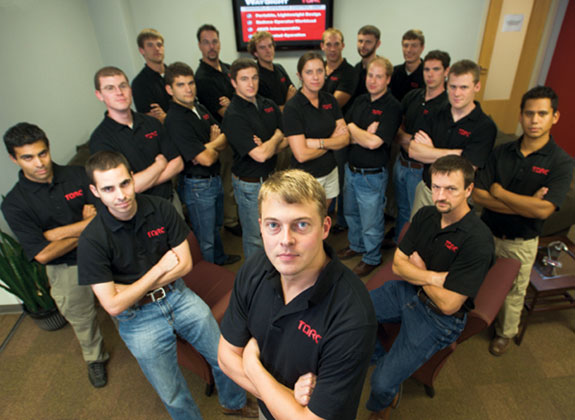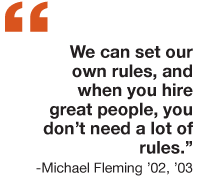FEATURE

As Michael Fleming and a visitor walked by, TORC Robotics software writers were "in the zone," and Fleming was loath to interrupt their concentration. He knows precisely where a large part of the magic happens for his company, a rising star in the highly competitive autonomous vehicles industry.
Touring TORC in the Virginia Tech Corporate Research Center (CRC), Fleming (mechanical engineering '02, M.S. '03), the company's CEO and co-founder, also pointed out a lab where engineers build and assemble robotics prototypes. He noted the communications specialists working on publicity for the company's latest project for the U.S. Marine Corps, the Ground Unmanned Support Surrogates (GUSS). The business team was huddled in a glass-walled conference room, planning an upcoming project.

Collectively, TORC's components demonstrate why this university spinoff company is a success story—one of many in the Roanoke and Blacksburg regions. Technology companies account for 18 percent of regional employment; and between 2002 and 2009, the area added 382 such companies, according to a 2009 study by the Roanoke Blacksburg Technology Council (RBTC).
Founded in 2005 and now employing about 35—with plans to add more in the near future—TORC itself is a microcosm of this remarkable regional growth. Fleming arrived at Virginia Tech in 1997, and while earning his undergraduate and master's degrees and engaging in robotics research, including an intelligent ground vehicle competition that Tech won five years in a row, he spotted a disturbing trend. Bright and talented students would work with exceptional professors to develop groundbreaking innovations, only to "graduate and their technology would die," Fleming said. "And then the cycle would repeat itself. … Technology needed to be transitioned and commercialized to change the world and make robotics commonplace in society."
In response, Fleming—who apologizes when his passion for robotics repeatedly carries him off on tangents—co-founded what is now known as TORC Robotics with the mission, as he describes it in the most basic terms,"of developing commercial technology that allows a computer to do what you and I do driving from home to work every day." Generally speaking, TORC concentrates on software and systems technology "building blocks" that allow the hardware (vehicles) to see what humans see, plan the way humans plan, and control itself the same way people control vehicles with their hands and feet. The company installs and calibrates robotic components, such as actuators, sensors, and computers, that turn formerly manned vehicles into autonomous ones. Often, TORC partners with Virginia Tech professors and students who specialize in the hardware.
In the early days, TORC worked with engineering professors Charles Reinholtz (who has since left Tech), Al Wicks, and Dennis Hong—who were overseeing the DARPA Urban Challenge effort at Tech—along with the professors' students. They jointly converted a Ford Escape Hybrid into an autonomous vehicle that successfully navigated 60 miles of urban environment and took home a third-place prize of $500,000 in 2007. "These professors were supportive of the Virginia Tech-TORC partnership," Fleming said. "Without their support and vision, TORC would not be where we are today."
In a world where technology changes so fast that by the time an inventor obtains a patent the technology might no longer be useful, partnerships are essential for a research university. "The focus of the collaborations is to leverage the research capabilities of the university with the commercialization capabilities of a small business," said Wicks, who pointed out that collaborations such as the one with TORC also give teachers more time to focus on their primary "deliverable"—educated students. "TORC is a great example of the talent we have at Tech," he added.
Companies such as TORC benefit from an entrepreneurial mindset among Tech faculty members. As president of Virginia Tech Intellectual Properties (VTIP), Mark Coburn oversees an organization that helps faculty members and researchers measure the commercial viability of their ideas and bring inventions to the marketplace. Compared to the average, VTIP counts twice as many patent applications, issued patents, and disclosures per university research dollar, Coburn said. And while Tech administrators do their part in supporting an entrepreneurial culture, Coburn noted that "there seems to be a bubbling up from the bottom of entrepreneurialism, and I think it's driven by faculty recognizing [that] their students desire real-world experience."
Because TORC "planned for success early on" by focusing on what potential customers might want even before starting development, Fleming said, the TORC technology that helped make Tech's Victor Tango DARPA team a winner has found its way both into an autonomous military vehicle that saves lives in Afghanistan by clearing explosives ahead of dismounted soldiers and into gigantic 700-ton Caterpillar surface-mining trucks that will improve safety and profitability. Now the company is working on GUSS, an autonomous mule-like vehicle to carry the equipment that Marines or soldiers usually have to haul on their backs.
A fully established and self-sufficient company that has grown and profited every year since its inception, TORC made use of the advantages offered at the CRC and of the expertise and business-startup assistance provided by VT KnowledgeWorks, from which TORC has since "graduated." "We were one of the first companies into their program," Fleming said.
And in an effort to give back to the university, TORC advises and sponsors student robotics teams. Students intern at the company, and Fleming has been working with the university to set up a robotics minor. According to Fleming, the symbiosis of small companies like his working with larger companies and academia has brought millions of dollars to Tech. "It's apparent to me that [the symbiosis is] working," he said. "I want to accelerate that."
Fleming becomes particularly animated when talking about what he envisions in the future. "TORC and Virginia Tech are primed to make autonomous vehicles on public roads a reality in the next five years" because legislative and liability barriers are starting to crumble, said Fleming. In addition, TORC works extensively with the Virginia Tech Transportation Institute (VTTI), which already has an "outstanding" test site for autonomous driving. "We are working to expand the envelope of autonomous technology by increasing the speed at which autonomous vehicles can drive" in highly congested traffic that's moving quickly, he said.
Back at TORC's headquarters in the CRC, Fleming has recognized something else valuable: Humans have to play. After all, they're not robots.
At the end of one hallway is a room with a huge flat screen and Nintendo WII, right next to the kegerator. Through another door are the poker, ping-pong, and pool tables. All are essential.
"We can set our own rules, and when you hire great people you don't need a lot of rules," Fleming said with a grin. "We have a lot of fun at work."
When a company hires great people, it's clearly a part of a regional trend. Driven by a prevalence of resources offered from inside and outside the university, the tech-sector is taking on a life of its own. The RBTC study estimated almost 40,000 tech sector jobs in the greater Roanoke and New River Valley regions—proof that those looking to merge into the fast lane of innovative entrepreneurship need look no farther than Southwest Virginia.